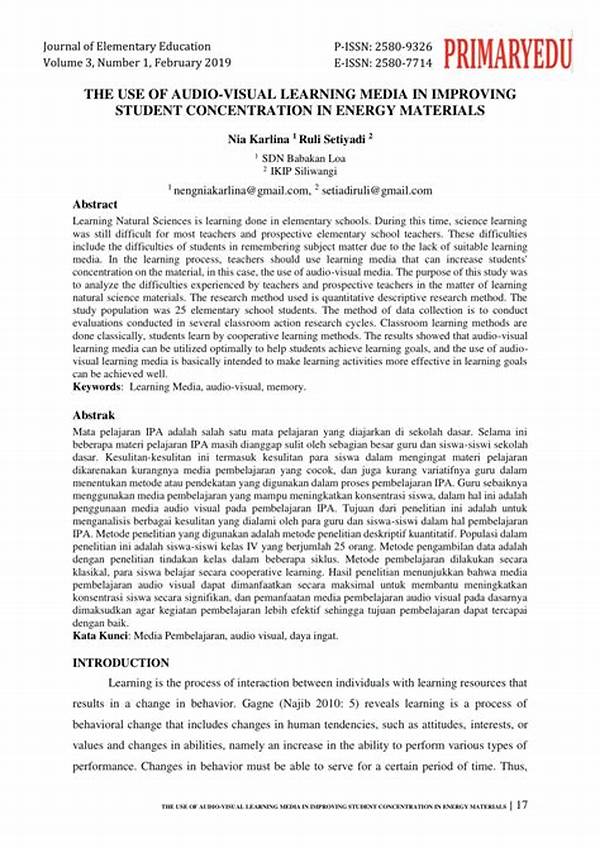An Engaging Path to Academic Success
Imagine a learning environment where even the toughest subjects transform into captivating adventures. The secret? Audio visual learning media. In a world obsessed with multitasking, where distractions lurk around every corner, keeping students engaged in challenging subjects can seem like a Herculean task. Traditional teaching methods often fall short; however, audio visual aids as a supplemental medium offer an innovative solution, promising an effective way to capture students’ attention and improve their concentration.
Read More : Guide To Upgrading Old Sound System To Digital Av
Educators and students across the globe are singing the praises of audio visual learning media, claiming it as a game-changer in today’s educational landscape. It’s not just a trend—it’s a revolution in making difficult subjects more digestible. Whether it’s the periodic table in chemistry, complex historical events, or mind-boggling mathematical equations, audio visual tools like interactive videos, animations, and graphics have proven their worth in enhancing understanding and retention.
Capturing Attention with Visual and Auditory Elements
Gone are the days when textbooks and lectures were the sole proprietors of knowledge dissemination. With the advent of audio visual learning media, education has stepped into a new frontier. These tools are designed to cater to different learning styles, ensuring every student finds a medium that dialogues best with their understanding. But how exactly does this happen?
The Multi-Sensory Experience
Audio visual learning media cater to visual learners who comprehend better through images and auditory learners who absorb information effectively through sound. By engaging multiple senses, these tools create a rich learning environment, effectively holding students’ attention and improving concentration, especially during tough subjects.
The Power of Visual Storytelling
Visual storytelling paired with auditory cues helps in embedding complex concepts into a student’s memory. Picture this: a historical event animated to life or a 3D model explaining a geometrical theorem. These aren’t just lessons; they’re stories that captivate and inspire. As these narratives unfold, they etch information deep within the learner’s mind, aiding recall and application of knowledge.
Innovative Approaches and Techniques in Audio Visual Learning
The integration of audio visual learning media in educational settings is not just about using flashy gadgets or high-end technology. It’s a systematic approach that involves various well-thought-out techniques and methods to ensure enhanced learning experiences for students tackling tough subjects.
Interactive Videos and Animations
Interactive videos that allow students to engage with the content directly make learning intriguing. Clickable elements that reveal additional information, quiz questions that test comprehension in real-time, and animations that simplify complex ideas—these are just a few examples of how interactive content captivates attention and reinforces learning.
Engaging Simulations and Models
Simulations and 3D models in subjects like biology and physics offer a visual treat that textbooks simply cannot. When students can visualize how a cell functions or how forces interact, abstract concepts quickly turn into practical knowledge. This hands-on experience, albeit virtual, boosts concentration and drives deeper understanding.
Read More : Led Wall Usage Trends For Events And Concerts
Statistics and Research: The Effectiveness of Audio Visual Media
Numerous studies underscore the effectiveness of audio visual learning media. Research suggests that students retain approximately 80% of what they see and do, contrasting sharply with only 20% of what they read. But what does this mean for practical classroom settings?
Improved Test Scores and Retention Rates
Educational institutions incorporating audio visual learning media report marked improvements in test scores and retention rates. For instance, a study revealed that students exposed to video content in difficult subjects performed 20% higher on tests than those who relied solely on traditional methods. The data clearly shows: when the going gets tough, the tough get visual!
Embracing Change: Adopting Audio Visual Learning in Classrooms
Taking action is the next step. Adopting audio visual learning media isn’t just a choice; it’s a necessity to meet modern educational demands. As we embrace new technologies, educators become facilitators, guiding students through a stimulating, interactive learning experience.
Consider the long-term benefits: students not only perform better but enjoy learning more. Schools that have implemented these media report higher engagement levels and enthusiastic participation, transforming not just classrooms but the futures of the learners themselves.
In summary, audio visual learning media improve concentration and enhance learning experiences during challenging subjects. It’s a creative blend of storytelling, technology, and pedagogy that keeps students enthralled and educated. It’s high time to be a part of this transformation. Stand at the forefront of educational innovation and offer students the tools to build a brighter future.
